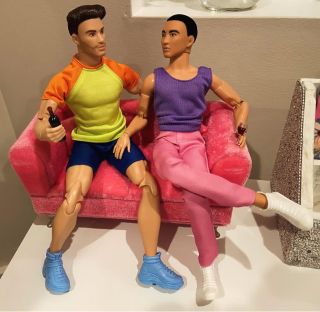Identity
Why Gay Men Collect Barbie Dolls
Understanding a community's fascination with Barbie dolls.
Posted July 16, 2024 Reviewed by Gary Drevitch
Key points
- Barbie expands on the cultural significance of inclusion in the gay community.
- For gay men, collecting Barbie dolls can serve as a way to reclaim or reaffirm a sense of identity.

In the world of collecting, passions often run deep and defy conventional expectations. That’s a good thing, or else I don’t think I’d have a job as a geek therapist and toy analyst. On the other hand, I also wouldn’t have found a wonderful community of toy collectors worldwide. One such fascination that has intrigued clinicians, theorists, marketing departments, and collectors alike is the affinity that some gay men have for Barbie dolls. It might seem unconventional or even paradoxical, but a closer and more affirming examination reveals a complex interplay of personal identity, intersectionality, diversity, cultural influence, and psychological factors.
Nostalgia, Identity, and Representation
Let's be clear: No theory can speak for a whole population of people. Yet, after 6 years of research, podcast interviews, and consulting for toy companies and innovation departments, one thing is clear: Barbie is for everyone. For many gay men I’ve interviewed or supported in therapy, collecting Barbie dolls represents a celebration of identity and a connection to a formative part of their childhood. Barbie, with her ever-evolving fashion sense, insurmountable amounts of money and ever-evolving careers, serves as a symbol of aspiration and possibility. Psychosocially, often isolated or fearful of growing up with a Queer identity, men might have found solace and inspiration in Barbie's world, which often provided a safe space for exploring creativity and self-expression. Also, speaking for myself, the pink convertible and queer-coded Ken, with his magic earrings and chiseled chest didn’t hurt either. I had a lovely Christmas in 1992, thanks to affirming parents. Not everyone can say the same.
Psychologically speaking, collecting Barbie dolls allows people to reclaim or reaffirm a sense of identity that may have been challenged, denied, or suppressed over their lifespan. The world of Barbie, more so in 2024, serves diversity in appearance and a spectrum of personal expression and beauty ideals—there is much work to be done in decentering their problematic history, but Mattel is taking steps—offering collectors a way to explore and celebrate different facets of themselves. This has been a significant experience in my clinical practice: Through Barbie, many gay men find a voice in expressing themselves through collections, highly curated displays that bring joy, creativity, and play which are critical throughout the lifespan.
Cultural Significance: A Connection to the Gay Experience
The cultural significance of Barbie has been debated since her scandalous debut in 1959. Barbie reflects a mirror of societal norms, trends, and ideals—not always to a warm reception, yet, this is where gay men have found solace in Barbie. In coming out, their experience has not always been affirming. At 11.5 inches, Barbie has adapted to reflect changing attitudes toward gender, race, and body image, albeit with occasional controversy. Gay men who collect Barbie dolls often find themselves drawn to these cultural narratives, seeing their collections as a way to engage with and critique prevailing societal values. Collecting Barbie was, until recently, rebellious of the toxic masculinity and homophobia rampant in their experiences. It certainly was for me, as she often accompanied me to grade school to offset the slurs and indifference I’d face. Tucked away in my bookbag was always a smile, and a fashionable high heel.
Barbie has transcended mere toy brand status. She is a cultural icon. Collecting Barbie dolls allows enthusiasts to participate in a broader dialogue about consumerism, gender roles, and the evolving nature of play and identity in contemporary society. This post serves as testament to a changing time in psychology, toy collecting, and hopefully, our approaches to play.

Psychological Motivations
In my psychological perspective, collecting Barbie can fulfill a variety of needs. For some, it may provide a sense of nostalgia, comfort, and even discovery, evoking memories of cherished childhood experiences or escapism from feelings of discomfort. The act of collecting itself can be therapeutic, offering a sense of control and mastery over one's environment. Thousands of Instagram accounts can attest to the beauty of displays, with some collectors boasting hundreds of dolls, beautifully displayed and curated to their own sense of style. Many collectors' displays rival the best of toy museums worldwide. Collectors meticulously curate their collections, showcasing their unique tastes and aesthetic preferences. The process of hunting for rare dolls or accessories can be exhilarating, fostering a sense of achievement and camaraderie within the community. Affirmingly, the internet allows many gay men to find what Barbie provided them as children: community, kindness, and a sense of belonging.
Community and Connection
We don’t need theoretical models to see what is clearly important to these collectors. Collecting Barbie dolls can foster a sense of community and connection among gay men, as well as collectors at large, across all intersections of race, gender, ethnicity, and experience. Shared interests in collecting can lead to friendships, support networks, and opportunities for socialization. In a world where social acceptance and belonging can sometimes be elusive, Barbie-collecting communities offer a welcoming space for individuals to connect with others who share their passion and can understand their experiences. No two collectors' stories that I’ve heard have been the same. As a psychotherapist, I find this clinically relevant; as a gender queer toy collector, I find it life-altering. We are one and the same: People, with a joy and an interest in self-expression, connection, and identity, be it as a collector, a gay male, or a toy analyst.
The phenomenon of gay men collecting Barbie dolls illustrates the multifaceted nature of human identity and the ways in which individuals navigate and negotiate their place in society, or their sense of self when society doesn’t offer the place they know they belong. Far from being mere toys, Barbie dolls serve as potent symbols of personal and cultural significance, offering collectors a means of self-expression, connection, and exploration. By embracing Barbie and her world, collectors reclaim a piece of their past while shaping a vision of their future—one that is colorful, diverse, and uniquely their own.
References
vulture.com/article/barbie-earring-magic-ken-story.html
Instagram image: peterandrewdanziglscw


